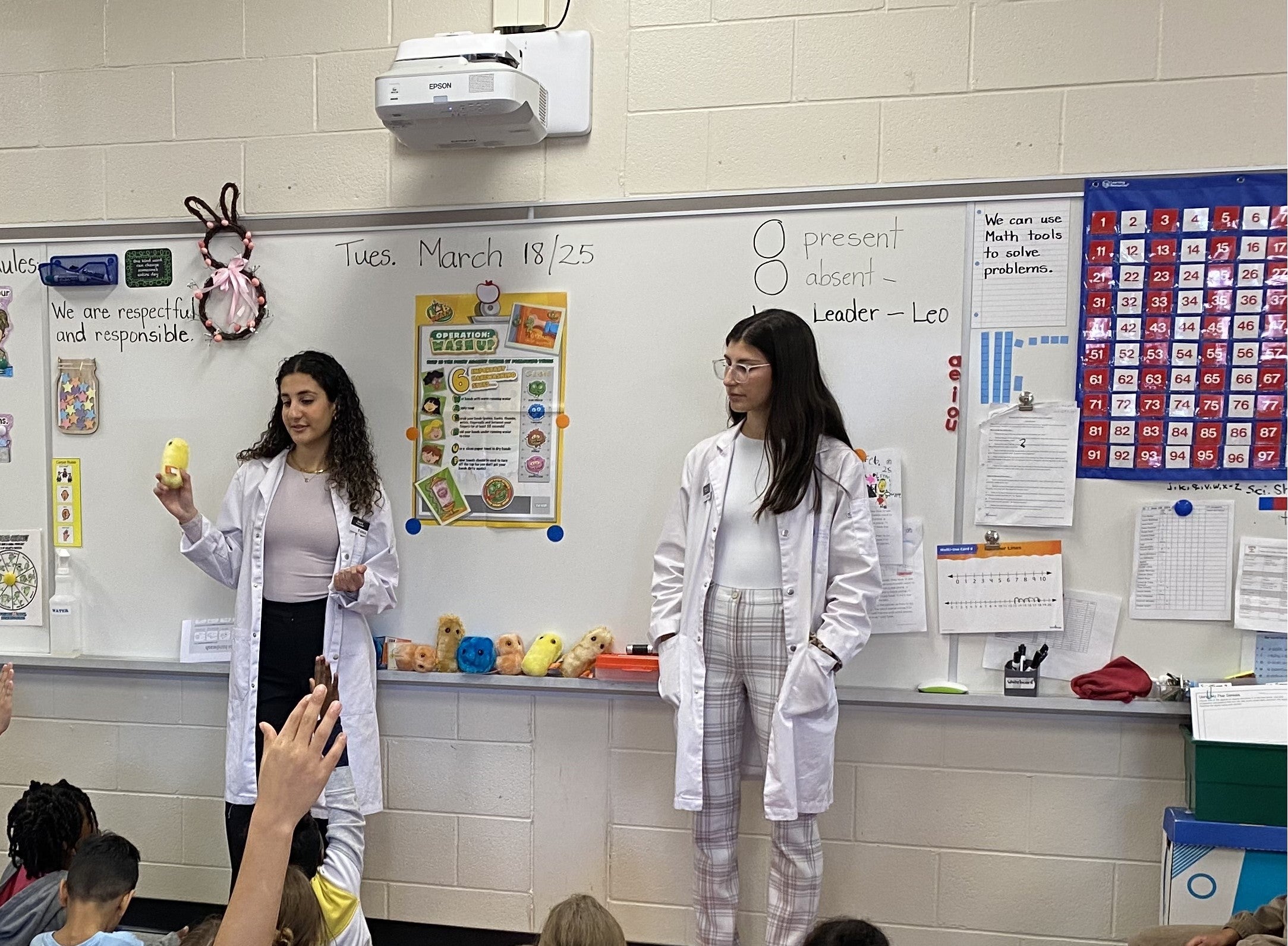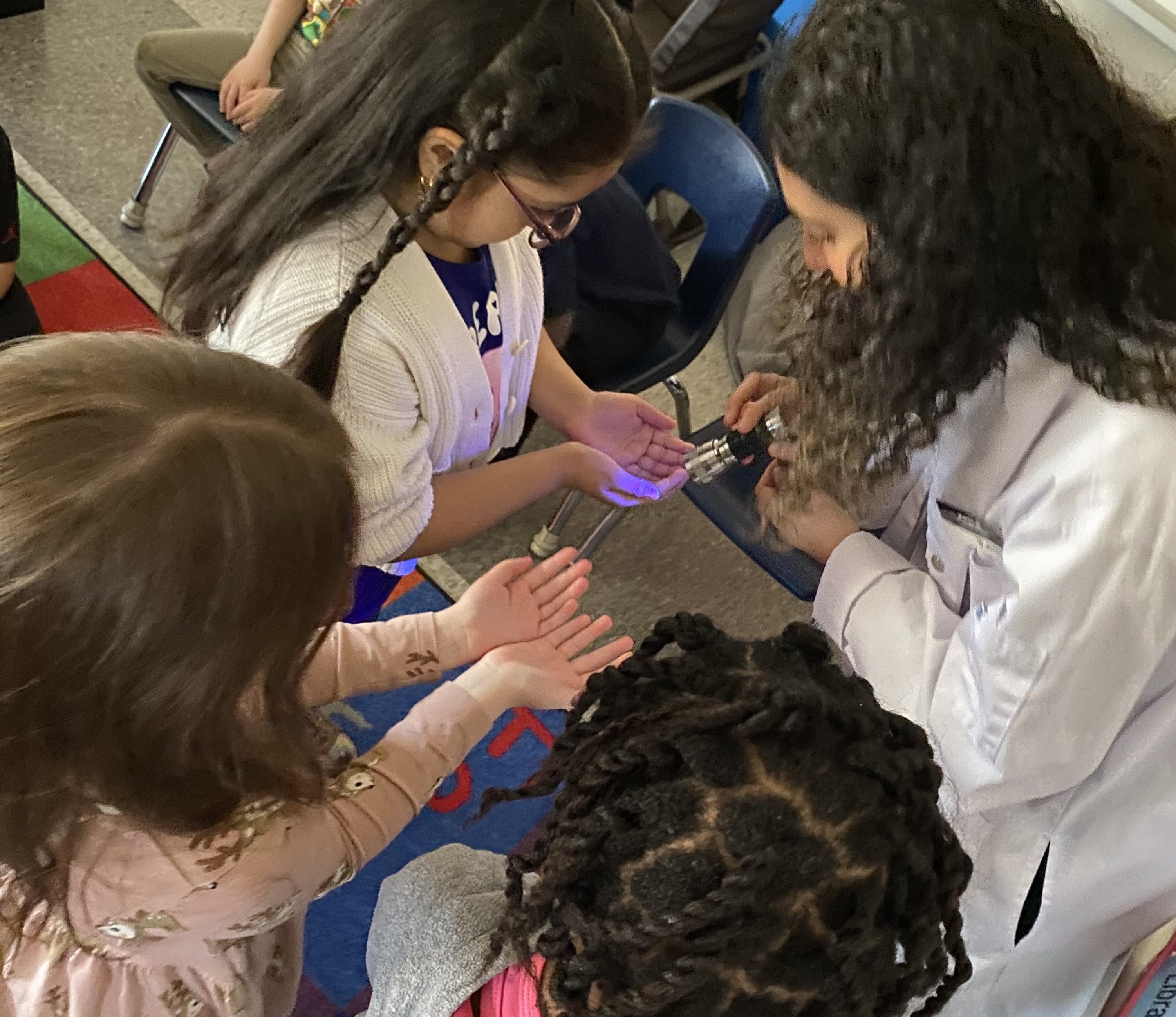
Pharmacy students give back to local elementary schools
University of Waterloo School of Pharmacy students visit Region of Waterloo elementary schools for Pharmacy Appreciation Month
Since 2016, every March during Pharmacy Appreciation Month (PAM) pharmacy students from the University of Waterloo School of Pharmacy visit local elementary schools in the Region of Waterloo to educate kids on what pharmacy is and what pharmacists do.
This year during PAM, 31 pharmacy students volunteered, organized and presented to more than 450 elementary students across six schools in the region.
Giving back to the community
Pharmacy student volunteers Karen Hakim (Rx2026), Mariam Elsoukkary (Rxz2026) and Mahnoor Shah (Rx2026) spent the day speaking to elementary students from grade 1 to 6.
“When we asked the students if they were familiar with the role of a pharmacist. None of them raised their hands,” says Hakim.
“The children’s concept of healthcare begins and ends at the physician level. It’s important to us that we inspire the youth and show them how a pharmacist can help them,” Shah adds. “It’s also important they see a person of colour in a pharmacist role.”
Pharmacy students tailored their presentations for each grade level. They incorporated hands-on activities such as handwashing, understanding allergies and the importance of medicine. Most importantly they made sure each activity was accessible based on their age group.
“Incorporating a 20 second song to sing, such as happy birthday, while they wash their hands helps make the activity more enjoyable and ensures they complete the task for the right amount of time,” Shah says.
“We visually showed them why washing their hands helps them from getting sick. It’s important for children to understand why they’re completing a task that and it helps to explain it to them in a way they can understand,” Elsoukkary adds.
Young children and can be easily distracted. Using bacterial plushies is a great way for pharmacy students engage them, to get them to start asking questions.
For older kids, pharmacy students explained medications in a way that they can understand. What medications are, how they’re tailored and dosed to each person, the importance of disposing of expired medications properly.
“We hope that the kids’ biggest take-away is not only understanding the purpose of medications but also learning how to identify them and stay safe around them,” Hakim says.
“It was so rewarding to showcase our pharmacy to the kids, it showed a glimpse into our profession while teaching them important concepts,” Hakim says.
Developing communication skills as future pharmacists
Knowledge translation is an important skill for pharmacy students to gain for their future careers as pharmacists. When they volunteer to present to elementary school children they practice explaining their pharmacy concepts to a different audience, in a different way. This helps students gain a valuable skill while giving back to their community.
“Our knowledge as future pharmacists is highly technical, but in our future practices we’ll need to learn how to disseminate information that’s accessible to different audiences,” Elsoukkary says.
Pharmacy brings together service and science. There are many different pharmacy professions and a wide range of careers a pharmacist can contribute to, but all require explaining therapeutic knowledge to different audiences.
“With kids you want to deliver the message in an accessible way so they can apply it in their lives at home and school without oversharing our deep pharmaceutical knowledge,” Shah says.
“Their retention is proof that they understand,” Elsoukkary adds. “When we asked them questions at the end of our presentation they were able to repeat the most important information back to us.”
What pharmacy students wish they knew when they were kids
Hakim reflects on the broader healthcare picture, “when kids think, what do I want to be when I grow up and think of healthcare they associate it with doctors. It’s hard as a kid to understand the big picture. I would’ve wanted to know that other healthcare professionals exist, such as nurses, social workers, physiotherapists, pharmacists and more.”
Shah speaks on the important of healthcare teams. “I didn’t realize, even as an adult, that pharmacists work in teams. It’s so great to see more interdisciplinary teams in healthcare.”
Elsoukkary would’ve wanted to know that she could’ve asked a pharmacist for help and advice on any medication in the store, not just prescriptions. “As a kid when I went to the pharmacy with my family, I didn’t know that you can ask pharmacists questions beyond prescriptions. There’s so much a pharmacist can do for you.”
Thank you to the clubs and students involved in the elementary school visits this year, the University of Waterloo Canadian Association of Pharmacy Students and Interns (CAPSI) chapter, Pharmacy Peer Relief Network (RxPRN) and the Paediatric Pharmacy Advocacy Group (PPAG).







